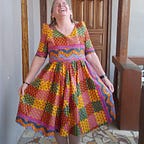“You Can See How I Am Now”
In early December in Uganda, a road accident left Boniface with two crushed arms. Today, he faces a life with no hands.
Boniface, my friend in Uganda, is rearranging his life less than two weeks after an early morning bus accident left him with two amputated arms.
Surely he is wondering, what can I do now?
Half a world away, I am also asking, what can I do now, too, from here? Because I am the one with the means to make something happen on his behalf.
Here’s the backstory, with some details I didn’t include in my first telling of Boniface’s misfortune.
For 35 years, Boniface was the bellman that everybody loved at the Fairway Hotel in Kampala, Uganda. That’s how we met back in 2015, and we have stayed in touch as friends.
For the 10 or so times I was a Fairway guest in the last four years (traveling to Uganda on volunteer assignments with an international NGO), Boniface was always there.
He was everybody’s favorite, a delight to be around. Fairway guests who returned looked forward to seeing him again, as I always did.
He retired in May with great fanfare and appreciation from his employer, the management of the family-owned hotel.
But early December brought tragedy. My understanding of what happened comes from Michael, another dear friend who is a longtime driver for the Fairway.
I tried to find a Ugandan newspaper’s account of the accident, but couldn’t. So, from a mutual friend’s telling:
Boniface and his son were traveling on a night bus from Kampala to Lira, five hours to the north. They were making the trip to check on Boniface’s daughter.
Then the bus overturned at 1:30am. I cannot determine if any lives were lost. But Michael notes that many were injured.
Boniface’s son was unharmed, and lifted an injured man out of the bus he presumed to be Boniface. But it was instead someone else! He returned and found his father, whose one hand had already been severed.
Boniface’s second hand was broken beyond treatment, and doctors completely removed it at the hospital.
“He is helpless, and we are his hands now,” Michael related in his first communication with me.
He further said that, more recently, the Fairway Hotel management — Boniface’s employer for 35 years — has set up a bank account in Kampala to receive contributions toward Boniface’s expenses.
There is discussion of assisting him in getting fitted for prosthetic arms and hands. But how? This is never-before territory for everyone even remotely close to Boniface’s life.
Quite amazingly, there is hope very close to home for Boniface in Uganda. Because, here’s why: When you google “Uganda” and “prosthetics,” there are inspiring resources — and current research.
Such as this BBC item from October 2017, when University of Salford (in Manchester, UK) designed prosthetics for a woman farmer whose (mean) husband attacked her with a machete and cut off both her arms.
From a 2017 abstract describing the University of Salford’s work: “ Upper limb loss can have devastating effects on an individual, particularly if that person is already surviving at a subsistence level. Prostheses can be used to replace the missing limb, offering both cosmetic and functional benefits. In lower and middle income countries (LMICs), conflict and road traffic accidents mean that demand for upper limb prostheses is high, however provision is sparse, and maintenance is a major challenge.”
One educator-friend of many years back in Maine, Bonnie Fortini, put me on to such a Google search when she read my first Facebook post about Boniface’s tragedy.
“A quick search came up with articles about students at the University of Cincinati, Georgia State, SUNY and Texas Tech doing such prosthetic-design projects,” she messaged. “Staying hopeful!”
Even the World Health Organization in Geneva published a report as recently as August, called “Prosthetics services in Uganda — A series of studies to inform the design of a low cost, but fit-for-purpose, body-powered prosthesis.”
The relatively low-cost of manufacture using 3-D printers gets mentioned in additional articles on this topic.
As a result, I have hope for our good friend Boniface.
He faces not just the new physical adjustment of living without his own arms. He also faces the just-as-difficult emotional adjustment from the trauma of the accident.
Few days back, Michael helped me connect with Boniface in a video call via WhatsApp. Going in, I wasn’t sure what to say. But Boniface broke the ice.
“You can see how I am now,” he said as Michael held the phone up.
Talking suddenly was easier than I thought it would be.
“We are so sorry,” I told Boniface. “We care about you, and we will do all we can to help you. You have so many international friends who know and love you.”
When our call ended, I felt hopeful for Boniface all over again. And, so did he. I know this because another text from Michael soon arrived.
After our call, Boniface smiled and said this to Michael: “I know now that I did a great job at Fairway Hotel.”
Wow. And, indeed he did. For 35 years.
Next, I am going to set up a GoFundMe campaign with a $500 goal for Boniface. Won’t you join me in this response, once you see the link on Facebook?
Thanks. Asking for a friend.
— — — — — -
Katherine Cassidy, currently living and volunteering in Sierra Leone, can be contacted by email (katherine.cassidy@gmail.com).
